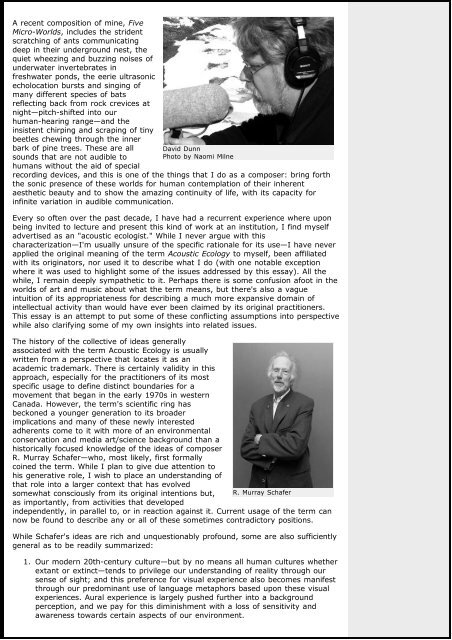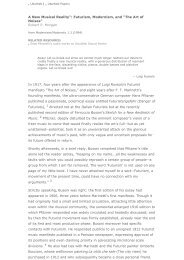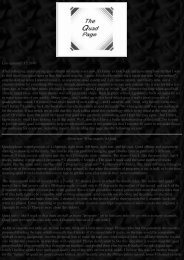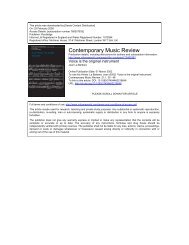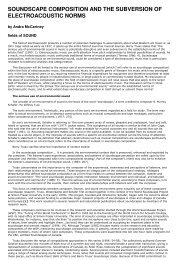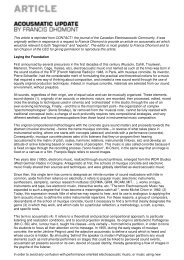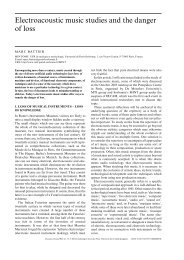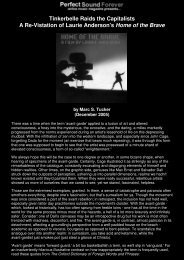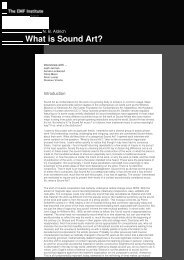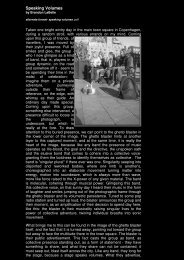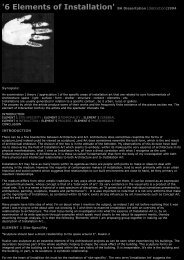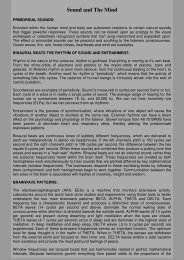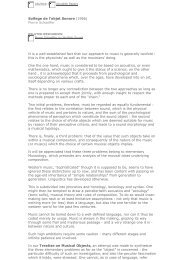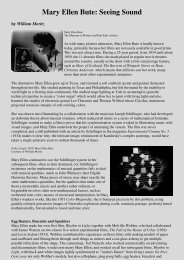A recent composition of mine, FiveMicro-Worlds, includes <strong>the</strong> stridentscratching of ants communicatingdeep in <strong>the</strong>ir underground nest, <strong>the</strong>quiet wheezing <strong>and</strong> buzzing noises ofunderwater invertebrates infreshwater ponds, <strong>the</strong> eerie ultrasonicecholocation bursts <strong>and</strong> singing ofmany different species of batsreflecting back from rock crevices atnight—pitch-shifted into ourhuman-hearing range—<strong>and</strong> <strong>the</strong>insistent chirping <strong>and</strong> scraping of tinybeetles chewing through <strong>the</strong> innerbark of pine trees. These are allsounds that are not audible tohumans without <strong>the</strong> aid of specialDavid <strong>Dunn</strong>Photo by Naomi Milnerecording devices, <strong>and</strong> this is one of <strong>the</strong> things that I do as a composer: bring forth<strong>the</strong> sonic presence of <strong>the</strong>se worlds for human contemplation of <strong>the</strong>ir inherentaes<strong>the</strong>tic beauty <strong>and</strong> to show <strong>the</strong> amazing continuity of life, with its capacity forinfinite variation in audible communication.Every so often over <strong>the</strong> past decade, I have had a recurrent experience where uponbeing invited to lecture <strong>and</strong> present this kind of work at an institution, I find myselfadvertised as an "acoustic ecologist." While I never argue with thischaracterization—I'm usually unsure of <strong>the</strong> specific rationale for its use—I have neverapplied <strong>the</strong> original meaning of <strong>the</strong> term <strong>Acoustic</strong> <strong>Ecology</strong> to myself, been affiliatedwith its originators, nor used it to describe what I do (with one notable exceptionwhere it was used to highlight some of <strong>the</strong> issues addressed by this essay). All <strong>the</strong>while, I remain deeply sympa<strong>the</strong>tic to it. Perhaps <strong>the</strong>re is some confusion afoot in <strong>the</strong>worlds of art <strong>and</strong> music about what <strong>the</strong> term means, but <strong>the</strong>re's also a vagueintuition of its appropriateness for describing a much more expansive domain ofintellectual activity than would have ever been claimed by its original practitioners.This essay is an attempt to put some of <strong>the</strong>se conflicting assumptions into perspectivewhile also clarifying some of my own insights into related issues.The history of <strong>the</strong> collective of ideas generallyassociated with <strong>the</strong> term <strong>Acoustic</strong> <strong>Ecology</strong> is usuallywritten from a perspective that locates it as anacademic trademark. There is certainly validity in thisapproach, especially for <strong>the</strong> practitioners of its mostspecific usage to define distinct boundaries for amovement that began in <strong>the</strong> early 1970s in westernCanada. However, <strong>the</strong> term's scientific ring hasbeckoned a younger generation to its broaderimplications <strong>and</strong> many of <strong>the</strong>se newly interestedadherents come to it with more of an environmentalconservation <strong>and</strong> media art/science background than ahistorically focused knowledge of <strong>the</strong> ideas of composerR. Murray Schafer—who, most likely, first formallycoined <strong>the</strong> term. While I plan to give due attention tohis generative role, I wish to place an underst<strong>and</strong>ing ofthat role into a larger context that has evolvedsomewhat consciously from its original intentions but, R. Murray Schaferas importantly, from activities that developedindependently, in parallel to, or in reaction against it. Current usage of <strong>the</strong> term cannow be found to describe any or all of <strong>the</strong>se sometimes contradictory positions.While Schafer's ideas are rich <strong>and</strong> unquestionably profound, some are also sufficientlygeneral as to be readily summarized:1.Our modern 20th-century culture—but by no means all human cultures whe<strong>the</strong>rextant or extinct—tends to privilege our underst<strong>and</strong>ing of reality through oursense of sight; <strong>and</strong> this preference for visual experience also becomes manifestthrough our predominant use of language metaphors based upon <strong>the</strong>se visualexperiences. Aural experience is largely pushed fur<strong>the</strong>r into a backgroundperception, <strong>and</strong> we pay for this diminishment with a loss of sensitivity <strong>and</strong>awareness towards certain aspects of our environment.
2.3.The framing of <strong>the</strong> concept of "<strong>the</strong> soundscape" as a defining metaphor forperceptually pulling forth <strong>the</strong> auditory characteristics of an environment intoforeground attention <strong>and</strong> insisting that <strong>the</strong>se sonic attributes be regarded as aconsistent organizing factor—not only for how <strong>the</strong> environment is defined <strong>and</strong>experienced, but as an essential feature for defining <strong>the</strong> historical <strong>and</strong> ongoingsocial relationship of humans to that environment.The necessity to heighten awareness of <strong>the</strong> negative consequences of certainhistorical developments in human societies that have resulted in <strong>the</strong> loss oftraditional knowledge conveyed through sound or, similarly, <strong>the</strong> increase ofindustrial "noise" that has both a disintegrating social impact <strong>and</strong>psycho-physiological destructive aspect. This concern has often been simplifiedinto issues of "noise pollution" <strong>and</strong> confounded with <strong>the</strong> more direct agenda ofenvironmental acoustics.The evolution of Schafer's ideas can be traced through his sequence of extraordinarywritings, starting with many of <strong>the</strong> general concepts, moving through curriculumoutlines <strong>and</strong> listening exercises, <strong>and</strong> eventually to <strong>the</strong> defining of a lexicon of formallanguage for framing all of <strong>the</strong>se ideas towards heuristic application <strong>and</strong> research.During <strong>the</strong> expansion of <strong>the</strong>se concepts, <strong>the</strong>re formed a larger collective of colleaguesthat became known as <strong>the</strong> World Soundscape Project. Books <strong>and</strong> recordings werepublished that demonstrated many of <strong>the</strong> group's core concerns <strong>and</strong> a st<strong>and</strong>ardarsenal of tools <strong>and</strong> strategies for increasing listening sensitivity to <strong>the</strong> environmentwere codified: soundscape recording, list making, oral history recording, various formsof sound mapping, amplitude <strong>and</strong> spectral charting of auditory spatial locations, soundwalks, <strong>and</strong> many o<strong>the</strong>r types of listening exercises that were especially geared foreducational uses with children. Overall <strong>the</strong> group produced a combination of activitiesdrawn from both <strong>the</strong> emphasis on experiential education that was burgeoning at <strong>the</strong>time <strong>and</strong> a form of quantifiable communication <strong>the</strong>ory that is more characteristic of<strong>the</strong> social sciences than of musicology. Diaries <strong>and</strong> field observations of specificgeographic locations (Vancouver <strong>and</strong> several European villages) resemblingethnographic field notes were made <strong>and</strong> data collected to subsequently createingenious charts <strong>and</strong> maps showing correlations between sonic l<strong>and</strong>marks <strong>and</strong>patterns of social organization <strong>and</strong> history.While <strong>the</strong> principal metaphor that Schafer used to formulate his concept of <strong>Acoustic</strong><strong>Ecology</strong> <strong>and</strong> <strong>the</strong> World Soundscape Project was <strong>the</strong> value of listening to <strong>the</strong>soundscape as if it were a musical composition—<strong>and</strong> even participating in how thatsoundscape gets "composed"—<strong>the</strong>re also seemed to be a dramatic schism betweenhis interests as a composer <strong>and</strong> <strong>the</strong> maintenance of <strong>the</strong> WSP as a somewhatabstract—<strong>and</strong> didactic—research project. The two always seemed separate in his mind<strong>and</strong> creative output. <strong>Acoustic</strong> <strong>Ecology</strong> may have been inspired by music but neverbecame music <strong>and</strong>, conversely, some of his music may have been influenced by<strong>Acoustic</strong> <strong>Ecology</strong> but never became "<strong>Acoustic</strong> <strong>Ecology</strong>" except in <strong>the</strong> mostrudimentary <strong>and</strong> academic of cases.In recent years this has somewhat shifted. As composer Warren Burt has remindedme, Schafer has been staging a series of ritualistic operas in <strong>the</strong> remote Canadianwilderness called Patria. Warren has made <strong>the</strong> excellent point that <strong>the</strong>se eventsrequire a real commitment on <strong>the</strong> part of <strong>the</strong> audience—sometimes several days ofhiking to, <strong>and</strong> living in, <strong>the</strong> performance locale—<strong>and</strong> <strong>the</strong>refore represent a seriousattempt at a renewal of <strong>the</strong> social function of music, one that moves much closer toreconciling Schafer's earlier music <strong>and</strong> his <strong>Acoustic</strong> <strong>Ecology</strong> concerns.In many ways <strong>the</strong> current expansion of <strong>the</strong> term <strong>Acoustic</strong> <strong>Ecology</strong>—which o<strong>the</strong>rwiseseems historically appropriate—is reinforced by a largely conservative musicalestablishment—especially in academia—interested in placing experimental musicalactivity into a zone of non-musical status. The term provides for a convenientoutlying conceptual domain where much sound-based art that o<strong>the</strong>rwise isthreatening to traditional musical values can, from that perspective, be exiled withoutuncomfortable argument. This can also be said about <strong>the</strong> split that has taken placebetween "concert music" <strong>and</strong> "sound art," where <strong>the</strong> latter has often been a forcedcategorization for certain kinds of experimental practice that aes<strong>the</strong>tically conflict withmore conservative musical assumptions: if it doesn't conform to certainpreconceptions about music, <strong>the</strong>n call it something else so those assumptions won'tbe seriously challenged.As a composer, Schafer has essentially been a Romantic Modernist (by no meansmeant as a pejorative) here defined as an interest in exp<strong>and</strong>ing <strong>the</strong> expressivepalette of music while maintaining an essentially 19th-century aes<strong>the</strong>tic concept of


